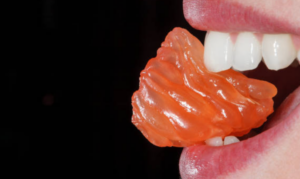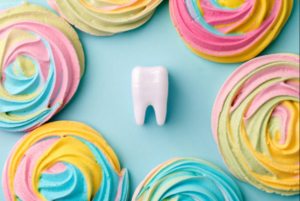What You Can and Can’t Eat with Dentures
Are you struggling with dietary adjustments after getting your $99 dentures in a day? This guide will help you navigate what’s suitable and what’s not. The good news is many options are available. Soft foods like mashed potatoes, yogurt, scrambled eggs, and soups are denture-friendly and nutrient-rich. Fruits such as bananas and melons are also a great choice. Rest assured, your palate won’t miss out on tasty meals.
What You Can Eat with Dentures
When navigating dietary changes with dentures, there are certain foods that you may find easier to eat. Soft foods such as mashed potatoes, yogurt, and scrambled eggs can be a great option as they require less chewing and are gentle on your dentures.

Smoothies are also a fantastic choice as they’re easy to consume and can be packed with nutrients.
Lastly, soups and stews can provide a comforting and nourishing meal; just let them cool down a bit before eating to avoid discomfort.
Soft foods
Indulge in savoring a variety of soft foods with your dentures, allowing you to enjoy delicious meals without any discomfort. Soft foods are an excellent option for those with dentures as they require less chewing and are easier to eat.
You can enjoy foods like mashed potatoes, yogurt, scrambled eggs, soups, smoothies, and ice cream. These foods provide the necessary nutrients and are gentle on your dentures, ensuring a comfortable eating experience.
Whether you’ve just gotten your dentures or you’ve been wearing them for a while, incorporating soft foods into your diet can make mealtime more enjoyable.
So go ahead and relish in these foods’ soft textures and flavors, knowing that you can still have a tasty and satisfying meal with your dentures.
Smoothies
Savor the delightful flavors of smoothies, a refreshing and nourishing option for those with dentures, providing a satisfying and hassle-free way to enjoy a nutritious meal.
With a smoothie, you can blend together a variety of fruits, vegetables, and even protein powders to create a delicious and satisfying drink. The smooth texture of the blended ingredients makes it easy to consume, even with dentures.
You can experiment with different combinations and flavors, adding in ingredients like bananas, berries, spinach, or even nut butter for added protein and nutrients. Smoothies are delicious and packed with vitamins and minerals, making them an excellent choice for a quick and easy meal or snack.
So, grab your blender and start creating your customized smoothie recipes to enjoy all the benefits while navigating dietary changes with dentures.
Soups and stews
Immerse yourself in the comforting warmth and rich flavors of soups and stews, providing a nourishing and satisfying option for those seeking a flavorful meal. With dentures, you may need to make some adjustments to enjoy these dishes fully.
Opt for softer ingredients, such as well-cooked vegetables, tender meats, and legumes, to make it easier to chew and swallow. Avoid chunky or fibrous ingredients that may get stuck in your dentures, such as large pieces of meat or tough vegetables. Blending or pureeing your soups and stews can also make them easier to consume.
Remember to let your soup or stew cool down slightly before eating to prevent any discomfort from hot temperatures. So go ahead and indulge in a bowl of hearty soup or stew, as it can provide you with a satisfying and nutritious meal while accommodating your dentures.
What You Should Avoid with Dentures
When it comes to dietary changes with dentures, there are certain foods that you should avoid. These include foods that are hard, crunchy, and sticky, as they can cause damage to your dentures or make them uncomfortable to wear.

Additionally, while adjusting to new dentures, you should avoid foods that require a lot of chewing. This can strain your dentures and make them more likely to slip or dislodge.
Foods that are hard, crunchy, and sticky
Explore the world of soft and tender alternatives to enjoy your meals without worrying about the challenges of hard, crunchy, and sticky foods with dentures.
With dentures, avoiding foods that can cause damage or discomfort is essential. Hard foods like nuts and popcorn can pressure your dentures and cause them to loosen or break.
Crunchy foods, such as raw vegetables and chips, can also pose a challenge as they require a strong bite force. Sticky foods like caramel and taffy can get stuck in your dentures, making them difficult to clean properly.
Instead, opt for softer options like cooked vegetables, tender meats, and soft fruits. These alternatives will not only be more accessible to chew and swallow, but they also reduce the risk of damaging your dentures.
Enjoy your meals with confidence and peace of mind, knowing you make denture-friendly choices.
Read More:- How Much Do Dentures Cost?
Foods that require a lot of chewing
Now that we’ve covered hard, crunchy, and sticky foods, let’s discuss the foods that require a lot of chewing.
When you have dentures, it’s essential to consider the amount of effort it takes to chew certain foods. Some foods, like steak or chewy candies, can be quite challenging for denture wearers. Chewing these types of foods may not only be uncomfortable but can also strain your dentures and potentially lead to damage.
Choosing softer and more easily chewed foods, such as cooked vegetables, tender meats, or softer fruits. These options will be gentler on your dentures, allowing you to enjoy your meals without discomfort or worry.
Conclusion
In conclusion, navigating dietary changes with dentures can be challenging, but it’s not impossible. You’ve learned that there are still plenty of foods you can enjoy. For example, you can have soft fruits, cooked vegetables, and tender meats. It’s important to avoid sticky and hard foods because they can cause damage to your dentures.



